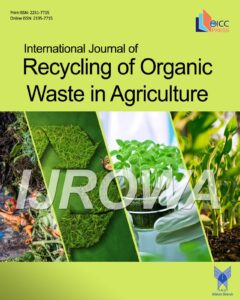Biotransformation of organic wastes through composting using Trichoderma harzianum and its effects on cucumber ( Cucumis sativus L.) yield
Authors
-
Adeniyi A Soretire
*
 1
1
- Cynthia A Ezema 2
- Chukwuebuka E Awaogu 2
- Chukwuagozie C Okafor 2
- Abasiama S Umoren 3
-
Nurudeen O Adeyemi
 4
4
Abstract
Purpose Soil nutrient depletion and possible degradation have been highlighted as key reasons for lower crop yields in Nigeria. The present study was aimed to assess the effect of Trichoderma harzianum on the bioconversion of different solid organic wastes into compost and its application on cucumber.
Method The treatments were 3 levels of T. harzianum inoculum (0, 5 and 10 ml) and 4 types of solid organic wastes (maize-cob, groundnut-pods, sawdust and their mixture) and soil. A small portion of the solid wastes (40 g) was weighed into each incubation jar with 10 g of chopped Guinea grass (Panicum maximum) and 20 g each of poultry manure. The compost was thereafter incubated for 12 weeks.
Results Total N, P and K contents were significantly (p < 0.05) highest in the mixture of solid organic wastes (22800 mg/kg), corn cobs (2600 mg/kg) and groundnut pods (2300 mg/kg), respectively. The growth parameters (plant height, number of leaves, leaf length, leaf girth and stem girth) significantly increased with increasing T. harzianum concentration. The highest fruit weight (105.84 g/plant) of cucumber was obtained in compost inoculated with 10 ml/pot of T. harzianum. Compost made of corn-cobs, groundnut pods and the mixture of the solid wastes significantly promoted the growth parameters. The highest fruit weight (117.99 g/plant) was obtained in a pot treated with a mixture of solid wastes.
Conclusion The use of T. harzianum in biotransformation of organic wastes could be a better tool to improve soil conditions thus enhancing the productivity of cucumber.
Highlights
- The application of composted mixed solid organic wastes increased accumulation of N, P and K more than the application of a composted single solid organic waste.
- Total N, P and K contents were highest in the composted mixture of solid organic wastes, corn cobs and groundnut pods, respectively.
- The highest fruit weight was obtained in a pot treated with a composted mixture of solid organic wastes.
- The application of composted solid organic waste inoculated with 10 ml/pot of Trichoderma harzianum enhanced the growth and the fruit yield of cucumber.
- Composted mixture of solid organic wastes treated with Trichoderma harzianum(10 ml/pot) was the best management system for increasing soil fertility and cucumber yield.



